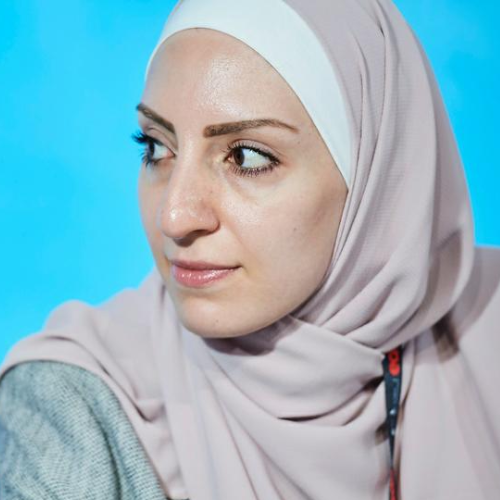

Rawan Tahboub is a PhD student at the Friedrich Schiller university in Jena, Germany. She’s currently working on using virtual exchange as a mechanism for reconciliation, using the inter-Palestinian conflict as her case study.
“The idea came from the potential of youth to actually take an active role in reconciliation or in deciding what they want in a Palestinian civil society.
Rawan Tahboub is a PhD student at the Friedrich Schiller university in Jena, Germany. She’s currently working on using virtual exchange as a mechanism for reconciliation, using the inter-Palestinian conflict as her case study.
“The idea came from the potential of youth to actually take an active role in reconciliation or in deciding what they want in a Palestinian civil society.
I wanted to look into different ways of collecting Palestinian communities and Palestinian youth from the West Bank, Gaza, East Jerusalem, as well as in the Diaspora to come together, to have an opportunity to speak to each other about what Palestinian identity means for them. How do they identify themselves, for example? What is their role in economics, in civil society, in active participation, in politics?
And in a way for them to discuss more what is an aspiring Palestinian civil society. Virtual Exchange seems a good way to trial this out.”
Rawan clarifies: “So, we’re not going into discussing what form the state should take, but rather how Palestinians should talk to each other and what aspirations they have for a Palestinian state. But looking at it in terms of focusing on the civil society itself.“
The state of play in the VE
Rawan explains that October marked the starting point for the implementation of the first iteration of the virtual exchange. She is hoping to complete five iterations, engaging more than 1,500 participants from Palestine.
The participants will also benefit from facilitation training offered by Soliya thereby gaining valuable transferable skills along the way. She hopes this will enable them to have an active role in facilitating dialogue later on with regard to a future Palestinian state.
The project is an Erasmus funded VE and is a collaboration between Friedrich Schiller university, Sharing Perspectives Foundation, Soliya and Hebron University in Palestine.
Other associated partners include the An-Najah National University,in Nablus, the Palestine Polytechnic University, also in Hebron, the Arab American University in Jenin.
She says this is to ensure diversity in terms of locations and universities.
Meanwhile, she is also liaising with different NGOs in Europe and Germany to also be able to get youth in the diaspora on board. They are also trying to work with UNWRA to gain access to refugee camps in Jordan, Lebanon, and Syria.
Challenging times
Rawan explains that building such partnerships takes a lot of time.
“So far, we’re successful with engaging most of the Palestinian universities on board. But with UNWRA, we’re still not 100% sure if they’re joining the first iteration. They have pledged to join the second iteration.
With NGOs, we have a problem a little bit more with commitment and actually engaging their participants. And this is why we have different approaches. So for universities, most of the universities have the virtual exchange as a component of an existing course.
And in this way, we get reliable participation from the participants, and we’re trying to see how we can work with the diversity and the dynamics there.”
Anticipated Results from the VE
One of the main things that Rawan is hoping to see emerge is empowering youth and giving them the opportunity to get into a genuine dialogue with one another –authentic conversations that allow them the opportunity to talk about their different stories.
“We also work a lot with personal stories that will give them the opportunity to reflect on what they’re living. So, for example, even if we’re having participants from Palestine, I want to look into the different dynamics between people living in the cities, in the villages, in the refugee camps. Because although they’re living in Palestine, they’re still having so many different experiences and I’m trying to capture those experiences to see if there’s potential for a kind of a common ground for discussion.”
Rawan makes clear that the virtual exchange itself does not aim to make reconciliation. But rather, It’s an exploration of the potential of actually using it as a first step for reconciliation and engaging youth.
There is one important element that Rawan hopes will achieve positive results.
This will be in the form of a CAP assignment, a Civic Action Project, where in the smaller groups, the participants will also divide themselves into smaller groups and come up with a project plan.
“It will be a small community initiative where the participants will actually write a project plan that they will implement and include progress reports. We hope there will be an element of sustainability in those initiatives.”
Final thoughts and reflections
“Virtual exchange gives a lot of opportunities, says Rawan, ” To be honest, I wore a lot of hats for virtual exchange. I started as a participant, but then I went on to become an experienced facilitator.“
Following that, she got into programme development as well as taking on a role as partnerships officer. It all culminated in her becoming a lecturer and engaging her students in VE when she was teaching at Hebron University as an integral part of her courses.
She wanted to explore the role of VE in helping students develop their personalities and skills as well as giving them the opportunity to exchange knowledge and fruitful discussions with people outside of Palestine.
She does this both internally but also externally with the diasporas.
Rawan says she is more than happy to share her findings with us once her five iterations are complete and the data is in!
